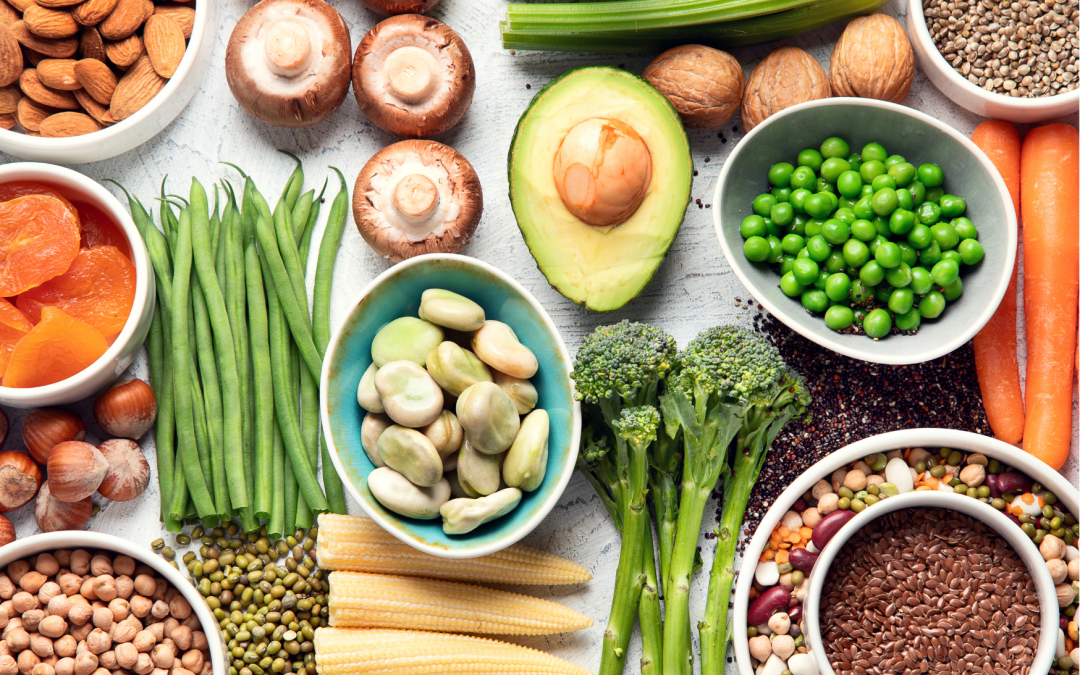Our gut is home to millions of bacteria, a huge community that work in harmony to achieve a balance that works for you. Many of the bacteria that calls our gut ‘home’, is beneficial whilst others can be problematic, but only become an issue if the balance shifts such as when a pathogenic strain is introduced (e.g. when we have food poisoning, or a gut virus), or if there is an overgrowth of the usually beneficial bacteria.
The bacteria in our gut is nourished by the foods we eat and how we move our bodies. Plant foods such as fruits, vegetables, legumes and wholegrains contain different types of fibres, or ‘prebiotics’. Prebiotics feed the beneficial bacteria in the gut and support increased levels of short chain fatty acids (SCFA) which lower the pH of the gut, making it less inviting to harmful bacteria. Findings from a large 2018 study found that participants who ate 30+ plant foods per week had a microbiome with more diversity than those who ate less than 10 plant foods. This meant a more diverse and greater population of gut bacteria colonizing the gut.
Healthy Gut = Happy Mind + Body
The gut is the foundation to so many important functions of the body.
- Help to digest food to best utilise the nutrients, and get rid of waste
- A strong and resilient immune system to help protect us against pathogens
- To guard us against the impacts of stress and improve our sleep
- Supporting a healthy weight range and help to balance blood sugar levels
- Provide a strong gut barrier that helps to optimize nutrient absorption, reduce reactivity to certain foods (less uncomfortable tummy symptoms, clearer and happier skin, )
- Supporting mental health by protecting the brain against age related damage or illness
- Making serotonin, our happiness neurotransmitter
How can I eat more plants?
- Add a veggie (or two) at every meal.
- Add grated veggies, red lentils or other soaked beans to stews, soups and casseroles
- Add frozen veggies, leafy greens, white beans, nuts and seeds to fruit smoothies
- Grated fruit, blended spinach, banana and oats are great additions to your weekend pancakes
- Serve meals with a simple and colourful side salad
- Stir chopped veggies through your scrambled eggs or frittata. Think diced capsicum, grated zucchini, peas, shredded greens or spring onion
- Snack on chopped fruit and veggies with plant-based dips such as nut butters, hummus or guacamole
- Meat Free Meals. Opt for vegetarian meals a couple of times a week. Veggie-loaded curries are delicious and filling, taste even better the next day for easy leftovers and you get the added benefit of flavourful, antioxidant rich spices
- Make simple swaps. Lasagne could be made with grilled zucchini, eggplant or pumpkin slices. Use spiralised veggies such as zucchini or carrot, or spaghetti squash instead of noodles. Swap rice with a mixture of wholegrains, or with ‘riced’ cauliflower or broccoli or add some broccoli, cauliflower or peas when boiling pasta and stir through your sauce as normal.
- Convenient combinations. Take advantage of premixed wholefoods or make your own in bulk to use across a few meals or snacks…
- A nut and seed trail mix can be enjoyed as a snack, sprinkled over salads, smoothies or porridge.
- Use 4-bean mixes (dried or canned) to add to soups, casseroles or salads.
- Pre-packaged salad leaf mixtures like kaleslaw are great salad bases, toppings for baked spuds or quick fillings for sandwiches and rice paper rolls
- Opt for a mixture when choosing frozen berries or vegetables
Keep an eye out for our upcoming THIRTY ebook to give you some inspiration of how to easily reach your 30 plant foods a week (hot tip, I’ve reached 30 in just 3 meals!!!) with over 40 recipes and loads of tips!
References
Crawford, D., Ball, K., Mishra, G., Salmon, J., & Timperio, A. (2007). Which food-related behaviours are associated with healthier intakes of fruits and vegetables among women?. Public health nutrition, 10(3), 256–265. https://doi.org/10.1017/S1368980007246798
Ducrot, P., Méjean, C., Aroumougame, V., Ibanez, G., Allès, B., Kesse-Guyot, E., Hercberg, S., & Péneau, S. (2017). Meal planning is associated with food variety, diet quality and body weight status in a large sample of French adults. The international journal of behavioral nutrition and physical activity, 14(1), 12. https://doi.org/10.1186/s12966-017-0461-7
McDonald, D., Hyde, E., Debelius, J. W., Morton, J. T., Gonzalez, A., Ackermann, G., Aksenov, A. A., Behsaz, B., Brennan, C., Chen, Y., DeRight Goldasich, L., Dorrestein, P. C., Dunn, R. R., Fahimipour, A. K., Gaffney, J., Gilbert, J. A., Gogul, G., Green, J. L., Hugenholtz, P., Humphrey, G., … Knight, R. (2018). American Gut: an Open Platform for Citizen Science Microbiome Research. mSystems, 3(3), e00031-18. https://doi.org/10.1128/mSystems.00031-18

